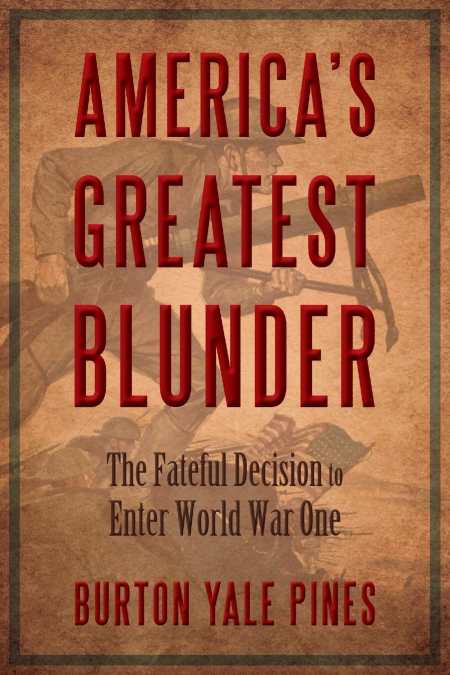America's Greatest Blunder
The Fateful Decision to Enter World War One
- 2013 INDIES Finalist
- Finalist, History (Adult Nonfiction)
- 2013 INDIES Finalist
- Finalist, War & Military (Adult Nonfiction)
This primer to American history asks “what-if” of the nation’s entrance into WWI, exploring the options with a well-paced and thoroughly researched narrative.
The entry of the United States into World War I was “one of history’s rare pivot points,” says veteran journalist and former Time magazine editor Burton Yale Pines, who believes US participation in that war was, as the title of his book states, America’s Greatest Blunder. Pines details how the United States went from being neutral—with citizens who were firmly anti-British, he says—to jumping into the war on the Allied side. The result, Pines asserts, was not only victory but also a punitive peace accord that “shaped the fate of most of the rest of the century,” and not in a good way.
Despite the title, comparatively little of Pines’s book deals with why he believes America’s entry into the war was a bad idea. The eight chapters instead deal with a quick overview of the war before and after the US entry, and how Britain—with the help of American bankers and industrialists—manipulated public and political opinion to push America into a war it did not want to join. Pines laments how the US failed to reign in the victorious Allies at Versailles and details the effectiveness of pro-Allied propaganda.
This work is a good primer for anyone who seeks to understand how a nation can be dragged into war. It also provides a good overview of the US participation in WWI on the strategic and political level. Pines spends very little time in the trenches or on the battlefield, instead focusing on the often stormy relationships between American commander General John “Black Jack” Pershing and his British and French counterparts. The author also gives a thorough analysis of why and how Germany launched its final, desperate offensives (their “last card” and final “roll of the dice,” as he puts it) and why they failed.
Many other historians have concluded that without the United States, the war-weary and nearly broken western Allies would likely have succumbed to the Kaiser’s forces, newly reinforced by legions freed from the Eastern Front by Russia’s withdrawal from the war. To the contrary, Pines believes the German final offensive was doomed from the start, yet he concedes that a German triumph would have “been ugly for the defeated” and “even more rapacious” than the one the Allies imposed on Germany at Versailles.
Pines’s key point is that without US entry, the two exhausted sides would have eventually come to the conference table to settle things, as was done at the end of the equally devastating Thirty Years War in 1648. The author cites many factors that should have driven them to negotiate; however, he undercuts that thesis when he rightly notes that there were also many reasons that prevented the key actors from doing so, notably their pride and inability to explain accepting something less than victory to their constituents and subjects who had gone through “the greatest slaughter in the history of the world.”
Pines offers a number of “what if” conclusions to a WWI that ends without American participation. While none of them are pretty, he asserts that “it is nearly impossible to imagine a worse, uglier, more self-destructive course than that which the 20th Century took” because of America’s involvement.
Reviewed by
Mark McLaughlin
Disclosure: This article is not an endorsement, but a review. The publisher of this book provided free copies of the book and paid a small fee to have their book reviewed by a professional reviewer. Foreword Reviews and Clarion Reviews make no guarantee that the publisher will receive a positive review. Foreword Magazine, Inc. is disclosing this in accordance with the Federal Trade Commission’s 16 CFR, Part 255.

